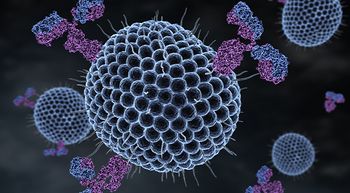
The future of melanoma treatment will include many combinations, explained Mario Sznol, MD, professor of medicine and co-leader of cancer immunology at the Yale Cancer Center.

The future of melanoma treatment will include many combinations, explained Mario Sznol, MD, professor of medicine and co-leader of cancer immunology at the Yale Cancer Center.

The FDA accepted and granted priority review to the supplemental biologics license application for nivolumab in combination with ipilimumab for the first-line treatment of patients with metastatic or recurrent non-small cell lung cancer.

In this special edition podcast, we spoke with both a physician and a nurse about the management of immune-related adverse events in patients with melanoma.

While the regimen was overall well tolerated, there are some adverse events for nurses to look out for.


There is still a lack of clear biomarkers in the metastatic renal cell carcinoma space.

There are 3 major immunothearpy agents in the melanoma space. Hear one expert talk about them.

Within approximately 1 year, 3 combination regimens featuring immunotherapy agents were approved by the FDA for the frontline treatment of patients with metastatic renal cell carcinoma (RCC), said Robert J. Motzer, MD.

Patients who develop immunotherapy-related colitis tend to have better outcomes, so it is important to get them back on treatment as soon as possible.

As immune checkpoint inhibitors begin to reshape how to treat patients with cancer, understanding treatment-free survival as an endpoint in clinical research can better characterize the effects of the treatment.

With new immune checkpoint inhibitors being utilized in treating patients with ICC, physicians need to study new ways to address irAEs associated with this treatment.

Canada’s first immunotherapy oncology program provides patient education to not only help them understand the therapy but also mitigate immune-related adverse events.

New studies are showing the dawn of a new era in how cancer care teams will go about treating patients with small cell lung cancer with immunotherapy combinations.

Immunotherapy in the neoadjuvant setting shows promise for patients with stage III lung cancer.

Immunotherapy as a frontline treatment for patients with advanced nonsquamous NSCLC is showing potential, but there is still additional testing that needs to be done.

The use of immunotherapy in tandem with chemotherapy is the future of treating patients with NSCLC, according to expert Catherine Shu, MD.

Lung cancer treatments are advancing. With these changes come new complications and questions that nurses will have to address with their patients.

At the 2019 ESMO Congress, the phase II KATE2 trial missed its primary endpoint but found promising results for a subgroup of patients with HER2-positive breast cancer with a PD-L1 expression.

Immunotherapy is sometimes considered solely for the later stages of treatment, but findings from a new study show promise for immunotherapy in treating patients with early breast cancer.

Experts are looking to use immunotherapy in different ways for patients with early-stage breast cancer.

Here are the top 5 Oncology Nursing News stories for September 2019.

While immunotherapy can be a life-saving approach for many patients with cancer, there are some cardiac adverse events that nurses should look out for.

The frontline combination of nivolumab (Opdivo) and ipilimumab (Yervoy) showed a robust and durable clinical benefit in patients with metastatic colorectal cancer (mCRC) whose tumors are microsatellite instability–high (MSI-H)/mismatch repair deficient (dMMR)—a population with a historically poor prognosis, said Heinz-Josef Lenz, MD, FACP.

Nurses must stay up to date on immunotherapy advancements, since they are the frontline communicators with patients.

From long-term data to additional clinical trials, more is needed to better understand immunotherapy in lung cancer.

Patients with cancer who are receiving immunotherapy may have improved responses if they have a healthy and diverse gut microbiome.

Oncology nurses shouldn’t be concerned if patients with non-small cell lung cancer experience skin toxic effects after immunotherapy.

The ACCC created the Immuno-Oncology Institute to help community practices address up-and-coming questions around immunotherapy implementation.

Nurses should be aware of patients who are at risk for immunotherapy-related myocarditis.

Healthcare providers should not base cancer care with immune checkpoint inhibitors on gender, according to recent study findings.